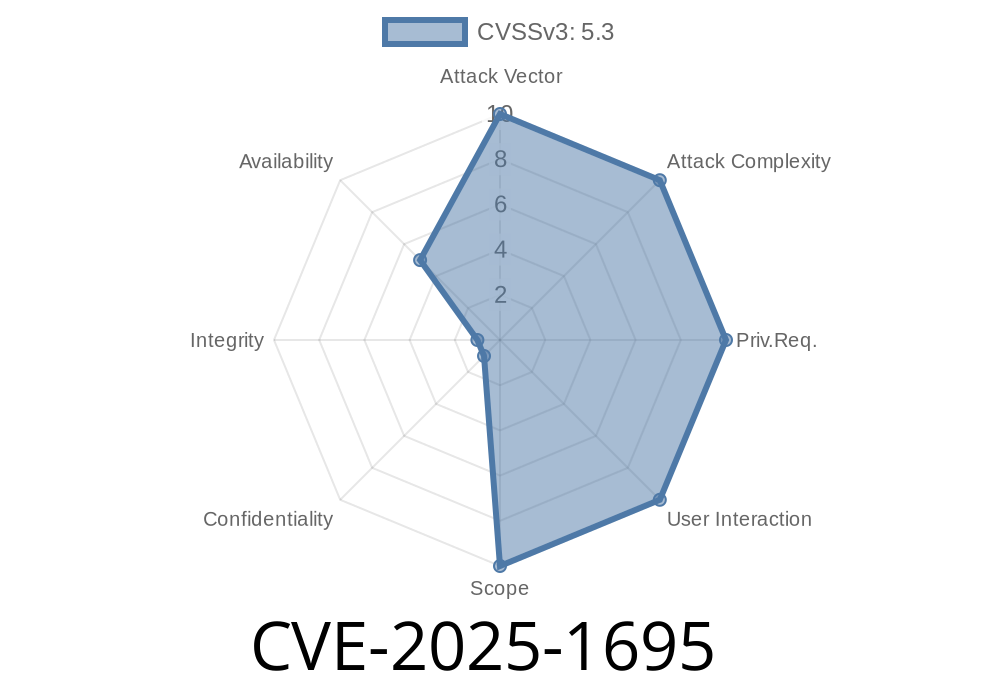Published: June 2024
Severity: Medium
Affected Product: NGINX Unit (Java Language Module)
Versions Impacted: Before 1.34.2
In this post, we'll dig deep into CVE-2025-1695—a fresh vulnerability found in NGINX Unit before version 1.34.2, specifically when running with the Java Language Module. We'll use simple language, break down how the bug works, show potential exploitation steps (with code snippets), and wrap up with mitigation guidance and reference links.
What Is NGINX Unit and Who Is At Risk?
NGINX Unit is a dynamic web and application server from the NGINX team, famous for its ability to run applications built in multiple languages, including Java.
If you're running your Java apps on NGINX Unit and haven't updated to 1.34.2 or newer, you're exposed to this vulnerability. *Note: NGINX does not evaluate or patch out-of-support (EoTS) versions.*
Impact: Possible high CPU use, reduced server performance, limited denial-of-service (DoS)
- CVE ID: CVE-2025-1695
Technical Breakdown
A flaw in how NGINX Unit's Java Language Module processes certain HTTP requests can trigger an infinite loop within the module's handler. This causes the server process to spike CPU usage, consuming resources until it's restarted or the offending process is killed.
This problem is specific to some undisclosed types of malformed or unexpected requests. The bug was found in the Java Language Module's data handling routines, and does *not* allow for code execution or data theft—but it does degrade your service.
> Note: This vulnerability is strictly limited to the data plane—your Unit control API is *not* affected. That means attackers can't break into your management interface directly using this bug.
Example: Simulated Exploit
To illustrate, let's look at a generic example. This won't reproduce the exact flaw (the report keeps specific triggers confidential for security), but here’s a *simulated* infinite loop scenario you might find in a Java HTTP handler:
public class VulnerableServlet extends HttpServlet {
@Override
protected void doGet(HttpServletRequest req, HttpServletResponse resp)
throws ServletException, IOException {
String kind = req.getHeader("X-Trigger");
// If a certain value is sent, we loop
if ("loop".equals(kind)) {
while (true) {
// Loop forever, CPU spikes!
}
}
resp.getWriter().write("Hello!");
}
}
In NGINX Unit, a malicious client can send a request that triggers vulnerable internal parsing logic, causing an infinite loop and driving up CPU use.
Assuming you set up a route to a Java handler (on localhost:808)
curl -H "X-Trigger: loop" http://localhost:808/
With the affected NGINX Unit version, a similar crafted input causes the worker to get stuck, leading to high CPU.
#### *Note: The true trigger is deeper in the NGINX Unit Java handler, not as simple as this demo. But the final effect is the same: a non-terminating request handler eats CPU.*
Real-world Impact
- Service Degradation: As worker processes loop, the underlying host may become unresponsive or slow to handle new requests.
- Resource Exhaustion: CPU use on the host will skyrocket, affecting neighboring apps or containers.
- Limited DoS: While it's not a total server crash, performance will drop, possibly leading to timeouts and user-facing errors, especially on smaller hosts.
UPDATE to NGINX Unit 1.34.2 or later.
See the official changelog
If you're running a version of NGINX Unit with the Java Language Module, *immediately update*. The patch eliminates the faulty code path, preventing infinite loops from request handling.
Mitigation (If You Can't Patch Yet)
- Use WAF rules or proxy filters to block malformed or suspicious request patterns (difficult here, as the trigger is internal).
Use monitoring to detect and kill high-CPU NGINX Unit workers.
- Limit Java worker process count (using cgroups, systemd, or container resource controls) to prevent whole-host exhaustion.
References
- NVD - CVE-2025-1695
- NGINX Unit Security Advisory
- NGINX Unit Changelog
- Unit Java Module documentation
Conclusion
CVE-2025-1695 reminds us that even high-quality, modular web servers can be tripped up by tricky request handling logic—especially in cross-language modules like Java. If you rely on NGINX Unit with Java, move fast, update, and monitor your systems for unusual CPU spikes.
Timeline
Published on: 03/04/2025 01:15:10 UTC
Last modified on: 04/10/2025 18:55:19 UTC
